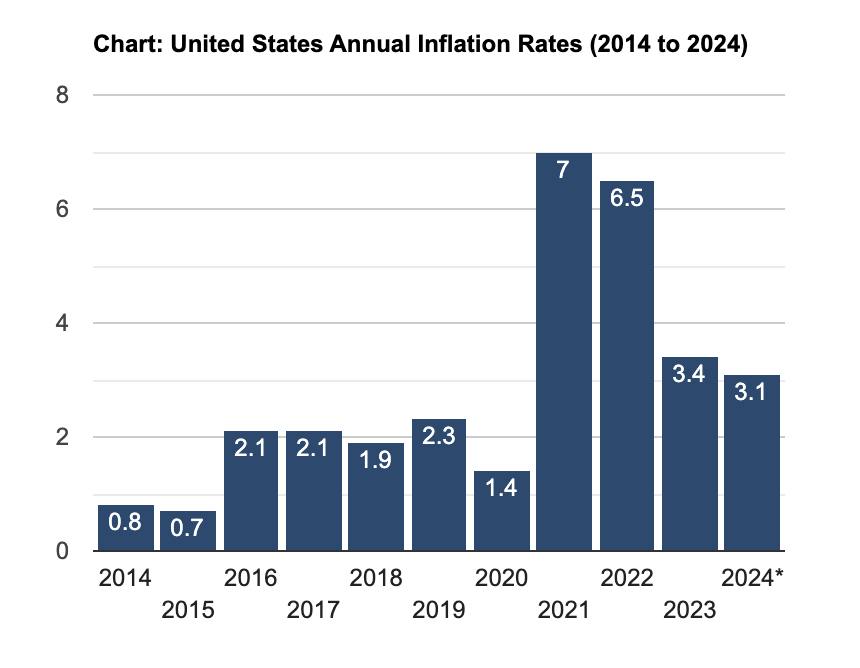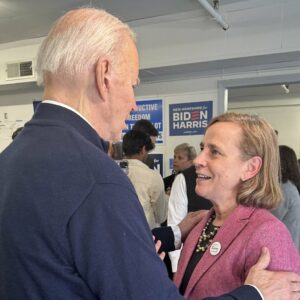On Monday, President Joe Biden was in New Hampshire touting his record of “Lowering Costs for American Families.”
On Tuesday, the Labor Department reported prices are still on the rise, as inflation rose to an annual rate of 3.2 percent in February. It’s the fourth consecutive month that inflation rose higher than economists expected.
Worse, the core inflation rate — which excludes volatile food and energy prices — was 3.8 percent, also higher than expected.
These new numbers add to Biden’s track record of overseeing the highest inflation rate of any president since the 1980s.

“Inflation is down two-thirds from its peak, and annual core inflation is near a three-year low,” Biden said in a statement Tuesday. “But we have more to do to give the middle class a fair shot.”
None of those numbers fit the narrative Biden presented to Granite Staters in Goffstown Monday, where he told a small group of supporters his policies were saving families money. Interestingly, however, Biden never used the word ‘inflation’ in his speech (other than referencing the Inflation Reduction Act), a sign he understands it’s a losing issue for him in 2024.
Instead, Biden argued that government regulations on healthcare and taxpayer-funded subsidies have lowered costs for many Americans.
“Folks, working with your delegation, I’m protecting and expanding the Affordable Care Act. A record-breaking 21 million Americans have signed up for healthcare under the ACA, including 65,000 folks right here in New Hampshire.
“I enacted tax credits that save, on average, $800 per person per year, reducing healthcare premiums for millions of working families on the Affordable Care Act,” Biden said.
But in a nation of 330 million, all of whom buy groceries, gas and clothes, savings for 21 million people on the ACA doesn’t address the impact of inflation, New Hampshire Republicans said.
“Joe Biden giving a speech on lowering prices is rich given his own inflationary policies, which are causing a constant headache for New Hampshire families,” said National Republican Congressional Committee spokeswoman Savannah Viar. “His Democrat lackey in Congress, Chris Pappas, voted alongside Joe Biden to enact these inflationary policies, and the blame lies solely at his feet.”
At an Americans For Prosperity event highlighting the impact of inflation on local businesses last week, Desmond Holman, owner and manager of Daw Kun Thai restaurant in Manchester, laid out the new realities he’s facing.
“In 2019, the total cost of my ingredients was $50,000. Last year, it was almost $200,000,” Holman said.

GOP gubernatorial candidate Chuck Morse with Desmond Holman, owner of Daw Kun Thai restaurant in Manchester, at an event on the impact of “Bidenomics.”
“The coconut milk in all of the curries and our coconut soup went from $31 a case to $96 a case. The oil for the fryer went from $17 to $45. Eggs went from $15 to $35. It’s just across the board, everything we buy.”
Holman’s assessment aligns with the findings released by the National Federation of Independent Businesses (NFIB) on Tuesday.
“The NFIB Small Business Optimism Index decreased in February to 89.4, marking the 26th consecutive month below the 50-year average of 98,” the pro-business organization announced. Twenty-three percent of small business owners reported inflation was their single most important business problem, up three points from last month, and replacing labor quality as the top problem.
Bruce Berke, New Hampshire’s NFIB state director, told NHJournal that “while hiring and the labor market has gotten slightly better, the cost to hire those individuals is what is driving costs in all sectors, thus the inflationary pressures.”
“Fortunately, the New Hampshire Senate and House are not adding to the inflation burden by passing costly legislation,” Berke added.
Meanwhile, the Republican National Committee (RNC) was quick to point out immediately after the report’s release that the current inflation rate is “twice the rate compared to when Biden took office.”
“Inflation has been at or above 3 percent for 35 straight months, well above the Fed’s average target of 2 percent,” the RNC added.
An Economist/YouGov poll found earlier this month that 61 percent of Americans disapprove of the Biden administration’s approach to handling inflation.
A recent Harvard-Harris poll found 60 percent of Americans see the economy as “on the wrong track,” 58 percent see it as weak, and 54 percent report their current personal economic situation “is underwater.”





